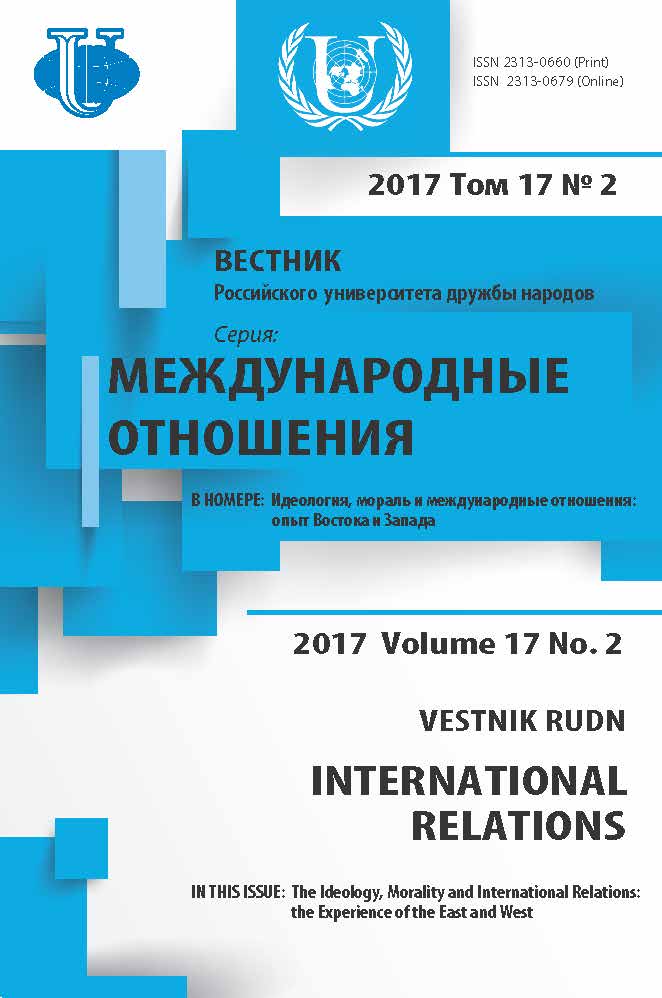Stereotyped Visual Symbols as a Mean of Public Consolidation in Context Of International Genocide Recognition
- Authors: Ivanova E.A.1, Kulikov S.V.1, Sulzhenko A.A.1
-
Affiliations:
- Peoples’ Friendship University of Russia (RUDN University)
- Issue: Vol 17, No 2 (2017): The Ideology, morality and international relations: the experience of the East and West
- Pages: 372-382
- Section: APPLIED ANALYSYS
- URL: https://journals.rudn.ru/international-relations/article/view/16070
- DOI: https://doi.org/10.22363/2313-0660-2017-17-2-372-382
- ID: 16070
Cite item
Full Text
Abstract
This article presents the results of the study devoted to stereotyped visual symbols as a part of the corporate identity complex of anti-genocide organizations aimed to reach an international genocide recognition as a part of their strategies. The relevance of the stud y is justified with the similarity of modern tools for visualizing the unique characteristics of organizations and centuries-old practice of opponents opposing each other, what was discovered in the investigation process. The effectiveness of the usage of stereotyped visual symbols as the means of public consolidation in combating the genocide, which is the purpose of this study, is proved. Using the method of structural and semiotic analysis, the authors studied visual symbols used as the means of broadcasting the public opinion coded into a key message within the framework of the anti-genocide organizations’ activities. The studied visual symbols were identified as the means of stereotyped influence aimed on the mass audience, which allowed us to conclude about the effectiveness of such symbols in solving problems in mass communications. During the generalization and systematization of the data obtained, the most frequently used symbols which enclose the codes of certain cultures were identified, which led us to the conclusion that such symbols are stereotypically used in the context of combating genocide and bringing the public forward the recognition of such conflicts.
About the authors
Elena Anatolievna Ivanova
Peoples’ Friendship University of Russia (RUDN University)
Author for correspondence.
Email: ivanova_ea@rudn.university
Moscow, Russia
Sergey Vladimirovich Kulikov
Peoples’ Friendship University of Russia (RUDN University)
Email: kulikov_sv@rudn.university
Moscow, Russia
Anastasia Anatolievna Sulzhenko
Peoples’ Friendship University of Russia (RUDN University)
Email: ms.sulzhenko@gmail.com
Moscow, Russia
References
- Avetisyan, R. S., & Lantsov, S. A. (2012). The Problem of Recognition of the Armenian Genocide in Modern Armenian-Turkish Relations. Vestnik SPbGU. Politologiya. Mezhdunarodnie otnosheniya, 6 (1), 98—105. (In Russ.).
- Campbell, B. (2015). Genocide as predation. International Journal of Law, Crime and Justice, 43, 310—325. doi: 10.1016/j.ijlcj.2015.05.004.
- Collins, A. D. & Lim, J. J. (2010). Recognition, redistribution and liberty. Journal of Economic Behavior and Organization, 74 (3). 240—252. doi: 10.1016/j.jebo.2010.03.005.
- Jung, C. G. (1981). The archetypes and the collective unconscious (Collected works of C.G. Jung. Vol. 9. Part 1). 2nd ed. Princeton: Princeton University Press.
- Kotlyar, T. V. (2011). Prevention of genocide at the international level. Vestnik Volgogradskoy akademii MVD Rossii, 2 (17), 34—39. (In Russ.).
- Krylov, А. N. (2014). Corporate Identity for Managers and Marketers. Moscow: IKAR. (In Russ.).
- Lippmann, W. (2010). Public opinion. Milwaukee (WI): Greenbooks Publications.
- Lotman, Yu. M. (1992). Selected articles in three volumes. Tallinn: Aleksandriya, Vol. 1. (In Russ.).
- Mischenko, Ya. (2015). UN and the problem of recognition of genocide. Diplomaticheskaya sluzhba, 4, 43—45. (In Russ.).
- Molina, L. E., Tropp, L. R. & Goode, C. (2016). Reflection on prejudice and intergroup relations. Current Opinion in Psychology, 11, 120—124. doi: 10.1016/j.copsyc.2016.08.001.
- Rapaille, C. (2007). The Culture Code: An ingenious way to understand why people around the world live and buy as they do. New York: Broadway Books.
- Starling, L. (2011). The Logo Decoded: What logos can do to you. Bloomington: Balboa Press.
- Uzonyi, G. (2014). Domestic unrest, genocide and politicide. Political Studies, 64 (2). 315—334. doi: 10.1111/1467-9248.12181.
- Zelinskiy, F. F. (2016). The Roman Republic. Saint-Petersburg: Aleteya. (In Russ.).
Supplementary files










